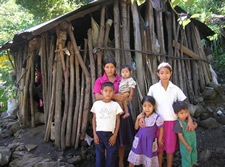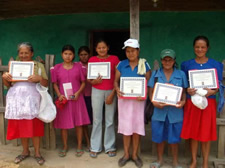Global Health
Overview of Program
The University of Rochester Family Medicine Residency Program has enjoyed a long-term continuity relationship for over 20 years with the small rural village of San José in the municipality of San Marcos de la Sierra, Intibucá, Honduras. Our program travels there to serve the community twice a year for two weeks at a time. We are in partnership with the San José community and work on their self-identified needs. This includes direct medical care but it more often involves community health projects such as ensuring water quality and access; improving cookstove functionality and availability; providing community health education; providing student education; improving agriculture; and addressing poverty by promoting financial self-sufficiency.
San José is a very rural, remote location with most of the inhabitants lacking running water and electricity. Our goal is twofold: to improve the health of the people of San José and to give our residents, medical students and faculty an outstanding experience in sustainable development in the context of a long-term relationship with a community. For more information and photographs of our work in Honduras please visit the global health section of our department website as well as the San Jose Partners website!
The Department of Family Medicine has partnered with the First Unitarian Church of Rochester in selecting and supporting middle and high school students to advance their education. Additionally, at the request of the local elementary school teachers, this partnership has added delivery of academic curriculum and English language skills to the community schools.
Location of Program
San José de San Marcos de Sierra, Intibucá, Honduras. This is in southwestern Honduras, 20 miles north of the Honduran/El Salvadoran border.
Description of Field Experience

Honduran family from San Jose
de San Marcos de Sierra
The group (10 to 15 people per trip) consists of medical students, family medicine residents and faculty, nursing students, dental faculty and residents, and Rochester community members. We divide the group between clinical care and community health projects, and everyone gets a chance to participate in both types of activities. Recent community health projects include:
- Improved cookstove installation
- Water filtration and storage projects
- Pila construction
- Latrine construction
- Agricultural projects such as drip irrigation farming and fish farming
- Preventative dentistry, including assessment, fluoride application, and extractions
- Grade school outreach projects
- Curriculum design sessions and English language practice sessions for local elementary school teachers
- Scholarship programs for middle school children
- Community health education performances
- Domestic violence assessment and education
- Sexual health education programs for young women
- Health surveys of local villages
- Midwifery training sessions
- Microfinance loans to prospective local small business entrepreneurs
Residents attend evening meetings in preparation for each two-week trip and a debriefing meeting upon return. In addition, residents attend a "packing party" before each two-week trip. Each resident takes leadership on two or three on-site projects in country during each trip. Trips typically occur in November and May each year.
We stay in a simple house we have built and have an excellent Honduran cook. We see patients in a government clinic building that is not staffed; no labs or X-rays are available. The terrain is mountainous, so we do lots of hiking when going out to neighboring villages. Recent Trip Reports
Global Health Didactics

Women health volunteers display certificates
after completion of domestic violence training.
The residency offers a Global Health teaching afternoon session annually. The format utilizes intra- and extra-departmental global health experts in presenting topics of importance through seminar style teaching. Second-year global health residents take responsibility for organizing the teaching afternoon, engaging their leadership skills to identify particular topics to present to their colleagues.
When in Honduras, there are global health lectures every night. All participants are expected to give a presentation on a global health subject.
Global Health Book Club
Over the history of the Global Health Track, faculty have introduced 35 books to the residency discussion group. Global Health Book Club is open to global health residents and faculty, as well as other travelers or interested persons in the larger global health community. This creates a diverse group of readers and discussants. During a resident’s three-year curriculum, they are introduced to 15 books or assigned reading materials (4-6 readings per year). Books come from a variety of genres to create a diverse teaching/learning environment: Autobiography/biography, graphic novels, historical, indigenous people, local history, literary, medical/forensic and science are the typical genres. The topics cover historical events affecting the community to the globe. Through cultural immersion in literature, readers travel to Afghanistan, Cambodia, Dominican Republic, Honduras, India, Iran, Morocco, Rwanda, Somalia, Southern California with the Hmong, and Sudan.
Global Health Faculty Leadership
Dr. Doug Stockman, Director of Global Health, leads every trip. Doug is the author of Community Assessment: Guidelines for Developing Countries, and lived and worked in West Africa for 3 years prior to joining our faculty. At least one other faculty member attends each trip.
Additional Global Health Resources
American Academy of Family Physicians Global Health

Society for Teachers of Family Medicine Global Health Toolkit
